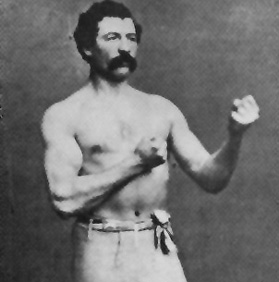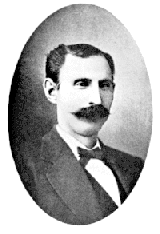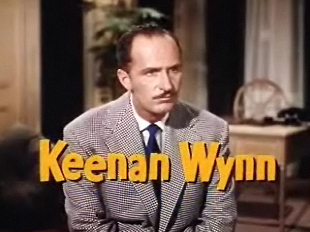
Boxing is a combat sport and martial art. Taking place in a boxing ring, it involves two people – usually wearing protective equipment, such as protective gloves, hand wraps, and mouthguards – throwing punches at each other for a predetermined amount of time.

Bill Richmond was a British boxer, born into slavery in Richmondtown, New York. Although born in Colonial America, he lived for the majority of his life in England, where all his boxing contests took place. Richmond went to England in 1777, where he had his education paid for. He then apprenticed as a cabinetmaker in York.

Bare-knuckle boxing is a full-contact combat sport based on punching without any form of padding on the hands. The sport as it is known today originated in 17th-century England and differs from street fighting as it follows an accepted set of rules.
Terry Wayne Norris is an American former boxer, prizefighter and a three time world champion in the light-middleweight (super-welterweight) division. Originally from Lubbock, Texas, he fought out of San Diego.

William Poole, also known as Bill the Butcher, was the leader of the Washington Street Gang, which later became known as the Bowery Boys gang. He was a local leader of the Know Nothing political movement in mid-19th-century New York City.

Louis Mbarick Fall, known as Battling Siki, was a Senegalese light heavyweight boxer born in Senegal who fought from 1912 to 1925, and briefly reigned as the world light heavyweight champion after knocking out Georges Carpentier.

John Morrissey, also known as Old Smoke, was an Irish American politician, bare-knuckle boxing champion, and criminal.

John Jackson was a celebrated English pugilist of the late 18th century. He is sometimes described in 20th and 21st century sources as having been the bare-knuckle boxing champion of England in 1795, after defeating Daniel Mendoza. However, sources from the 1790s and subsequent decades never describe either Jackson or Mendoza as having been champions of England.

John Camel Heenan, also known as the Benicia Boy, was an American bare-knuckle prize fighter. Though highly regarded, he had only three formal fights in his career, losing two and drawing one.

Jem Ward was an English bare-knuckle boxer. "A fine fighter and powerfully built man", he was the English champion from 1825 until 1831. He became known for being one of the first boxers to be sanctioned for deliberately losing a fight. During his fighting career he was nicknamed "The Black Diamond". In his retirement he became a successful artist.
Michael Wayne Quarry was an American light heavyweight boxer. He had a record of 63–13–6 including 17 knockouts during his career. He defeated such fighters as Jimmy Dupree.

Yankee Sullivan, also known as Frank Murray and James Sullivan, was a bare-knuckle fighter and boxer. He claimed the American bare knuckle heavyweight champion from 1851 to 12 October 1853. When Tom Hyer vacated his title, he laid claim to it, though many modern boxing historians dispute his claim. He lost any claim to the title after losing a fight to John Morrissey.

Tom Hyer was an American bare-knuckle boxer. He became a heavyweight boxing champion after defeating Country McCloskey in a long brutal fight in New York on September 9, 1841, though there was no sanctioning body to recognize his championship. Until he retired in 1851, he was widely celebrated as the first Heavyweight Boxing Champion of America. His victory increased American participation in boxing, and made him a celebrity; generating fight coverage and publicity in hundreds of American newspapers.

Jeremiah "Jerry" McAuley, along with his wife, Maria McAuley, founded the McAuley Water Street Mission in Lower Manhattan. Known as the "apostle for the lost," McAuley was a former "street thief" who found religion while spending seven years in Sing Sing prison during the 1860s. He started the first rescue mission to feed and shelter the poor who were mostly immigrants, leading to the creation of over 300 rescue missions in the United States.
Billy Madden (1852–1918) is best known as a champion American boxer, pugilistic trainer and manager. He was also a playwright, author and journalist, a producer of sporting events including wrestling matches and women's marathon bicycle races.
Lewis "Lew" Baker was a Welsh-American patrolman in the New York Police Department who was simultaneously employed as a "slugger" for Tammany Hall. He was involved in voter intimidation and election fraud during the 1840s and 1850s. A close friend and associate of Irish mob boss John Morrissey, Baker frequently battled supporters of the nativist Know-Nothing movement for over a decade. He is most remembered however as the assassin of William "Bill the Butcher" Poole. Baker shot and killed Poole in a Broadway saloon during a brawl. Both Baker and Morrissey were placed on trial for murder, but were acquitted.
James Turner was an American criminal figure, pugilist and "slugger" for Tammany Hall. Turner was one of several men under Captain Isaac Rynders who committed voter intimidation and election fraud for Tammany Hall during the 1850s. He and Paudeen McLaughlin were bodyguards to Lew Baker and were present with him when Baker fatally shot William "Bill the Butcher" Poole in the back in 1855.
Thomas Hadden was American saloon keeper, criminal and underworld figure in New York City's infamous Fourth Ward during the mid-to late 19th century. He was the owner of a Cherry Street dive bar, a popular underworld hangout located next to Dan Kerrigan's place, and co-led the Dead Rabbits with Kit Burns. For over 25 years, his Water Street boarding house was one of the most notorious "crimp houses" on the New York waterfront as thousands of sailors were shanghaied, robbed or murdered. Hadden, and contemporaries such as Bill Slocum or John Allen, exercised considerable political influence in the city and were generally able to receive protection from city officials throughout their criminal careers.

James Belcher, also known as Jem Belcher, was an English bare-knuckle prize-fighter and Champion of All England 1800–1805.

Tennessee Champ is a 1954 American drama film with strong Christian overtones directed by Fred M. Wilcox and starring Shelley Winters, Keenan Wynn, Dewey Martin, and Charles Bronson













